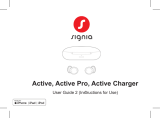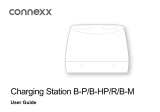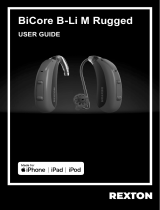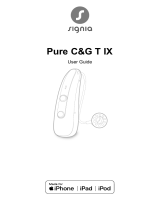Page is loading ...

AQ sound FS R,
AQ sound FS RT
hearing aid guide
AQ sound FS R
AQ sound FS RT
AQ sound FS R myChoice
AQ sound FS RT myChoice
HANSATON T Charger
HANSATON Comfort Charger Combi
HANSATON Charger

This user guide applies to the following models:
Hearing aids
AQ sound FS -R AQ sound FS -RT
AQ sound FS R AQ sound FS RT
AQ sound FS R AQ sound FS RT
AQ sound FS R AQ sound FS RT
AQ sound FS R AQ sound FS RT
AQ sound FS R myChoice AQ sound FS RT myChoice
Non wireless charging
accessories
HANSATON T Charger
HANSATON Comfort Charger Combi
HANSATON Charger
Hearing aid models Earpieces
c AQ sound FS R (9/7/5/3/1)
c AQ sound FS RT (9/7/5/3/1) c Dome
c AQ sound FS R myChoice c SlimTip
c AQ sound FS RT myChoice c cShell
Charging accessory
c HANSATON T Charger
c HANSATON Comfort Charger Combi
c HANSATON Charger
If no box is checked and you do not know the
model of your hearing aid or charging
accessories, please ask your hearing care
professional.
The hearing aids described in this user guide
contain a built-in and non-removable
rechargeable Lithium-ion battery.
Please also read safety information regarding
handling rechargeable hearing aids
(chapter 25).
Your hearing aid & charger details

1. Quick guide ............................................................................. 2
2. Parts of the hearing aid and charger ...................................... 4
3. Preparing the charger .......................................................... 10
4. Charging the hearing aids ..................................................... 11
5. Le and right hearing aid markers ........................................15
6. Putting your hearing aids on your ears ................................ 16
7. Removing the hearing aid ......................................................17
8. Multi-function button........................................................... 18
9. On/o ...................................................................................19
10. Tap control .........................................................................20
11. Connectivity overview .........................................................21
12. Initial pairing ....................................................................... 22
13. Phone calls.......................................................................... 24
14. Flight mode .........................................................................29
15. Rebooting your hearing aid ................................................. 30
16. Using the HANSATON stream remote App ...........................31
17. Listening in public places .................................................... 32
18. Operating, transport and storage conditions ..................... 34
19. Care and maintenance ........................................................ 36
20. Exchanging the earwax protection..................................... 40
21. Service and warranty .......................................................... 44
22. Compliance information .....................................................46
23. Information and explanation of symbols ............................ 51
24. Troubleshooting guide ....................................................... 55
25. Important safety information ............................................. 62
26. Tinnitus masker ................................................................. 85
Table of contents
Thank you
Thank you for choosing these hearing aids.
Please read the user guide carefully to make sure
that you understand and get the best out of your
hearing aids. Training is not required for handling
of this device. A hearing care professional will
help set up the hearing aids to your individual
preferences during the tting / sales consultation.
For more information regarding features, benets,
setup, use and maintenance or repairs of your
hearing aid and accessories – contact your hearing
care professional or manufacturer representative.
Additional information can be found in the
specication sheet of your product.

1. Quick guide
beeps every
30 minutes
Low battery warning
Multi-function button with indicator light
The button has several functions,
the primary function is as an on/o
switch. Together with your hearing
care professional, you can decide if it
also allows for volume control and/or
program change. This is indicated in
your individual instructions.
Phone calls: If paired with a Bluetooth® enabled
phone, a short press will accept and a long press will
reject an incoming call.
On/O: Firmly press the lower part of the button for
3 seconds until the indicator light blinks.
On: indicator light is solid green
O: indicator light is solid red
Enter flight mode: When device is o, press the lower
part of the button for 7 seconds until the solid orange
light appears. Then release the button.
Tap control
(only available for models 9, 7, 5 and 3)
If paired with a Bluetooth® enabled device, multiple
functions can be accessed using tap control, please
refer to chapter 10. This is also indicated in your
individual instructions.
To use tap control tap the top of your ear twice.
Charging your hearing aids
Before using your hearing aids for the rst time,
it is recommended to charge them for 3 hours.
Aer placing your hearing aid in the charger, the
indicator light on the hearing aid will show the
charging state of the battery until it is fully charged.
Charging: Slow blinking
indicator light
Fully charged: Solid green
indicator light
Le & right hearing aid markings
Red marking for
right hearing aid.
Blue marking for
le hearing aid.

5
2. Parts of the hearing aid and charger
1 Multi-function button with indicator light -
switches between listening programs, changes
the volume level, and accepts or rejects mobile
phone calls depending on your customized
tting
2 Wire - connects the speaker unit to your
hearingaids
3 Microphones - sound enters your hearingaids
through the microphones
4 Charging contacts
5 Dome - holds the speaker unit in place in your ear
canal
6 Speaker unit - amplies the sound and sends it
directly into the ear canal
7 Retention piece - helps prevent the dome and
speaker unit from moving out of the ear canal
8 Custom mold - holds the hearing aids in place
3
3
1
4
3
3
1
4
Possible earpieces
cShell SlimTip Dome
AQ sound FS RT hearing aids
AQ sound FS R hearing aids
2
5
7
6
8
2

6 7
Space for earpieces
Space for drying
capsule
(cover open) Drying capsule
(optional)
Hearing aid charging slots with le/right indicators
Space for drying capsule
(cover closed)
HANSATON Comfort Charger Combi
Charger
Indicator light for power
Micro-USB connection
to external power supply Space for earpieces
Hearing aid charging slots with le/right indicators
Charger case lid
HANSATON T Charger
USB-C connec-
tion to external
power supply

8 9
Space for earpieces
Hearing aid charging slots with le/right indicators
HANSATON Charger
Charger
Indicator light for power
Micro-USB connection
to external power supply
USB cable (< 3 m) Power supply*
External power supply
USB cables:
HANSATON Charger and HANSATON Comfort
Charger Combi use Micro-USB
HANSATON T Charger uses USB-C
* The power supply may not be provided with this product.
Any power supply with the below specications may be
used.
Power supply specication
Power supply input voltage 100-240 VAC, 50/60 Hz,
current 0.25 A
Power supply output voltage 5 VDC +/-5%,
current 1 A
Charger input voltage 5 VDC +/-5%,
current 250 mA
USB cable specications 5 V min. 1 A, USB-A to
USB-C, maximum
length 3 m

10 11
ab
d
c
3. Preparing the charger
Connecting the power supply
a) Plug the larger end
of the charging
cable into the
power supply.
b) Plug the smaller
end into the USB
port on the charger.
c) Plug the power
supply into a power
outlet.
d) The indicator light around the USB port will
light up green when the charger is connected
to the power outlet.
The charger may be used with an external power
supply that fullls the specications in the table
on previous page (page 9).
4. Charging your hearing aids
Low power: You will hear two beeps when
the hearing aid battery is low. You will have
approximately 60 minutes before you have
to charge the hearing aids, aer this time the
hearing aids automatically shut down (this can
vary, depending on the hearing aid settings).
The hearing aids contain built-in and non-
removable rechargeable Lithium-ion batteries.
Before using your hearing aids for the rst time,
it is recommended to charge for 3 hours.
The hearing aids must be dry before charging.
Please ensure to charge the hearing aids within
operating temperature range:
+5° to +40° Celsius (41° to 104° Fahrenheit).

12 13
Using the charger
Refer to chapter 3 for charger set-up
1) Insert the hearing aids into the charging slots
and the earpieces in the large cavity.
Make sure the le and right hearing aid
markings match the le (blue), right (red)
indicators next to the charging slots. The
hearing aids will automatically switch o
once inserted into the charger.
2) The indicator light on
the hearing aids will
show the charging
state of the battery
until the hearing aids
are fully charged.
When fully charged
the indicator light
will remain on, i.e.
solid green light.
Indicator light Percentage charged Charging time
-%
-8%
30 min (30%)
60 min (50%)
90 min (80%)
8-%
% h
The charging process will automatically stop
when the batteries are fully charged, so the
hearing aids can be safely le in the charger. It
can take up to 3 hours to charge the hearing
aids. The charger lid can be closed while
charging.

14 15
3) Remove the hearing aids from the
charging slots by simply liing them out of
the charger.
The hearing aid can be set to switch on
automatically when removed from the charger.
The indicator light starts blinking. The solid
green light indicates the hearing aid is ready for
use.
If you unplug the charger while the hearing aid
is charging inside, please make sure to turn o
the hearing aid to prevent discharge. To switch
o the charger, remove the power supply from
the power outlet.
Turn o your hearing aid before inserting it in
the disconnected charger to store it.
Do not hold the wires to remove the hearing
aids from the charger as this can damage them.
5. Le and right hearing aid markers
There is a red or blue marking on the back of the
hearing aid and on the speaker. This will tell you
if it is a le or a right hearing aid.
Blue marking
for le hearing aid.
Red marking
for right hearing aid.

16 17
6. Putting your hearing aids on your
ears
1. Place the hearing aid over
the top of your ear.
2. Hold the wire where it
attaches to the dome and
gently push the dome into
your ear canal. The wire
should lie flush against
your head and not stick out.
3. If there is a retention piece,
tuck it into the bowl of your
ear to secure your hearing
aid.
2.
3.
1.
7. Removing the hearing aid
1. Pull on the bend of the wire
and remove the hearing aid
from behind the ear.
Labeling
The serial number and year of manufacture are
located near the colored hearing aid marking.
1.

18 19
8. Multi-function button
Your hearing aids come with a multi-
function button that allows you to
further adjust them. The primary
function is as an on/o switch.
Together with your hearing care
professional, you can decide if it also allows for
volume control and/or program change.
If the hearing aid is paired with a Bluetooth®
enabled phone, a short press on the upper
or the lower part of the button will accept an
incoming call and a long press will reject an
incoming call – refer to chapter 13.
These instructions describe the default
multi-function button. Your hearing care
professional may change the functionality.
See your hearing care professional for more
information.
Bluetooth® is a registered trademark owned by the Bluetooth SIG, Inc.
9. On/o
Switch on hearing aid
The hearing aid is congured
to switch on automatically
when removed from the
charger. If this function is not
congured, rmly press and
hold the lower part of the button for 3 seconds
until the indicator light blinks. Wait until the
solid green light indicates the hearing aid is
ready.
Switch o hearing aid
Press and hold the lower part of button for
3seconds until the solid red light indicates the
hearing aid is switching o.
Blinking green Hearing aid is switching on
Solid red for 2
seconds Hearing aid is switching o
When you switch on the hearing aid you might
hear a start-up melody

20 21
10. Tap control
Tap control is available for models , , and .
If paired with a Bluetooth enabled device,
multiple functions can be accessed using tap
control e.g. accept/end phone call, pause/
resume streaming, start/stop voice assistant.
To use tap control tap the top of your ear twice.
11. Connectivity overview
The illustration below shows some of the
connectivity options available for your hearing
aids.
Please see the user guide that came with
your accessory for more information. Please
contact your hearing care professional to get
a TVConnector, Remote Control, PartnerMic or
Roger accessories.
Mobile phone
TV Connector
connected
to TV
PartnerMic

22 23
12. Initial pairing
Pairing to a Bluetooth® enabled device for the
rst time
It is only necessary to perform the pairing
procedure once with each device featuring
Bluetooth wireless technology. Aer the
initial pairing, your hearing aids will connect
automatically to the device. Initial pairing can
take up to 2 minutes.
1. On your device (e.g. a phone), ensure that
Bluetooth® wireless technology is enabled
and search for Bluetooth® enabled devices
in the connectivity setting menu.
2. Switch on both hearing aids. You now have
3 minutes to pair your hearing aids with your
device.
3. Your device shows a list of Bluetooth®
enabled devices. Select the hearing aid from
the list to simultaneously pair both hearing
aids. A beep conrms successful pairing.
Connecting to your mobile phone
Aer your hearing aids have been paired to your
phone, they will automatically connect again
when your phone and hearing aids are turned on
and in range. This can take up to 2 minutes.
The connection will be maintained as long as the
phone remains on and within range.
Your hearing aid can be connected to up to two
devices and paired to up to eight devices.

24 25
Caller’s voice
Your voice
13. Phone calls
Your hearing aids allow direct communication
with Bluetooth® enabled devices. When
paired and connected to a phone, you will
hear notications, incoming call notication
and the caller’s voice directly in your hearing
aids. Phone calls are “hands-free”, this means
your voice is picked up by the hearing aid’s
microphones and transmitted back to the
phone. Two active Bluetooth devices such as a
phone can be connected to your hearing aids,
with support for additional pairings.
Making a phone call
Enter the phone number and press the dial
button. You will hear the dialing tone through
your hearing aids. Your voice is picked up by the
hearing aid microphones and transmitted to the
phone.
You do not need to hold your mobile phone close
to your mouth, your voice is transmitted through
the hearing aids to your mobile phone.

26 27
short push
< 2 sec
tap ear
twice*
or
Accepting a phone call
When receiving a call, in-coming call notication
will be heard in the hearing aids (e.g. ring tone or
voice notication).
The call can be accepted by tapping the top of
your ear twice, a short press on the upper or
lower part of the multi-function button on the
hearing aid (less than 2 seconds) or directly on
your phone.
*Tap control available on , , and models
Le Right
Ending a phone call
A call can be ended by a long press on the upper
or lower part of the multi-function button on the
hearing aid (more than 2 seconds) or directly on
your phone. The phone call can also be ended
by tapping the top of your ear twice.
long push
> 2 sec
tap ear
twice*
or
*Tap control available on , , and models
Le Right

28 29
Rejecting a phone call
An incoming call can be rejected by a long press
on the upper or lower part of the multi-function
button on the hearing aid (more than 2 seconds)
or directly on your phone.
14. Flight mode
Your hearing aids operate between 2.4 GHz–
2.48 GHz frequency range. When flying some
operators require all devices to be switched
into flight mode. Entering flight mode will not
disable normal hearing aid functionality, only
the Bluetooth connectivity functions.
Entering flight mode
To disable the Bluetooth wireless function and
enter flight mode:
With the hearing aid turned o,
push and hold the lower part of
the button for seconds until
the solid orange light appears.
Then release the button. The solid
orange light indicates the hearing
aid is in flight mode.
Exiting flight mode
To enable the Bluetooth wireless
function and to exit flight mode,
switch the hearing aid o and then on again
using the lower part of the hearing aid button.

30 31
15. Rebooting your hearing aid
Use this technique if your hearing aid is in an
error state. This will not remove or delete any
program or settings.
1. Press the lower part of the multi-function
button for at least 15 seconds. It does not
matter if the hearing aid is switched on or o
before you start pressing the button. There is
no light or acoustic notication at the end of
the 15 seconds.
2. Place the hearing aid in the power-
connected charger and wait until the
indicator light blinks green. This can take up
to 30 seconds. The hearing aid is now ready
to use.
16. Using the HANSATON stream
remote App
Compatibility information
The HANSATON stream remote App can be used on
phones with Bluetooth Low Energy (LE) capability.
Please nd phone compatibility details on:
hansaton.com/support
Please nd the instruction for use on
hansaton.com/user-guides
Install the HANSATON stream remote App
for iOS / iPhone users, please scan the code:
Install the HANSATON stream remote App
for Android OS users, please scan the code:
iPhone® is a trademark of Apple Inc., registered in the U.S. and other countries.
iOS® is a registered trademark or trademark of Cisco Systems, Inc. and/or its aliates
in the United States and certain other countries.
Android™ is a trademark of Google LLC.

32 33
17. Listening in public places
Your hearing aids may have a telecoil option
(AQ sound FS RT) that can help you hear in
various public places such as a church, a
concert hall, a train station and
government buildings.
When you see this symbol, a loop
system is present and is compatible with your
hearing aids. Please contact your hearing
care professional for further information and
activation of the telecoil function.
How to use your telecoil function
Accessing the telecoil function that your hearing
care professional has set up is possible two
ways. Direct access to the telecoil program is
possible via a long press of the push button on
your hearing aid.
Alternatively it is possible to access the telecoil
program via the HANSATON stream remote App.
Ensure you are standing or seated within the
designated loop system area as noted by the
ocial telecoil symbol.

34 35
18. Operating, transport and storage
conditions
The product is designed such that it
functions without problems or restrictions if
used as intended, unless otherwise noted in
these user guides.
Please ensure to use, charge, transport and
store the hearing aids and the charger according
to the following conditions:
Use Charging Transport Storage
Temperature
Maximum
range
Recommended
range
+5° to +40°C
(41° to 104°F)
+5° to +40°C
(41° to 104°F)
-20° to +60°C
(-4° to 140°F
-20° to +60°C
(-4° to 140°F)
+5° to +40°C
(41° to 104°F)
+7° to +32°C
(45° to 90°F)
0° to +20°C
(32° to 68°F)
0° to +20°C
(32° to 68°F)
Humidity
Maximum
range
Recommended
range
0% to 85% (non
condensing)
0% to 85% (non
condensing)
0% to 70% 0% to 70%
0% to 60% (non
condensing)
0% to 60% (non
condensing)
0% to 60% 0% to 60%
Atmospheric
pressure
500 hPa to 1060
hPa
500 hPa to 1060
hPa
500 hPa to 1060
hPa
500 hPa to
1060 hPa
These hearing aids are classied as IP68. This
means that they are water and dust resistant
and designed to withstand daily life situations.
They can be worn in the rain but should not be
fully submerged in water or used when taking
a shower, swimming or other water activities.
These hearing aids should never be exposed
to chlorinated water, soap, salt water or other
liquids with a chemical content.
The HANSATON T Charger is classied as
IP21. This means that the charger is protected
from vertically falling drops of water when
the charger is tilted up to 15 degrees from the
horizontal. IP21 is satised when the charger lid
is closed.
If the device has been subject to storage
and transport conditions outside of the
recommended use conditions, wait 15 minutes
before starting the device.
/

















